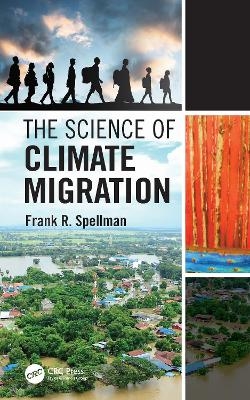
The Science of Climate Migration
CRC Press (Verlag)
978-1-032-28075-2 (ISBN)
This book addresses the nexus between science and migration and examines how the two are inextricably intertwined. The Science of Climate Migration primarily addresses the science of global climate change and additionally examines how this change is more than a region being too hot, too cold, too dry, too wet, or too windy; rather it is also about heightened military tensions, political instability, and myriad other factors. History has shown that this change is felt most acutely in developing countries that are least equipped to adapt. This inability to adapt is considered to be a driver that motivates local residents to find “greener pastures” through migration. Further, the book discusses the increasing need for the implementation and utilization of non-polluting renewables for use in energy production as a means to stave off environmental crises.
Features
Examines how and why climate change effects and human migration are inextricably intertwined
Discusses the increasing need for the implementation of non-polluting renewables for use in energy production as a means to stave off environmental crises
Explains how wildlife is also sensitive to shifts in climate and how this in turn affects their migration as well
Frank R. Spellman is a retired assistant professor of environmental health at Old Dominion University, Norfolk, VA, and author of over 155 books. Spellman has been cited in more than 400 publications; serves as a professional expert witness and incident/accident investigator for the U.S. Department of Justice and a private law firm; and consults on Homeland Security vulnerability assessments (VAs) for critical infrastructure, including water/wastewater facilities nationwide. Dr. Spellman lectures on sewage treatment, water treatment, homeland security and health and safety topics throughout the country and teaches water/wastewater operator short courses at Virginia Tech (Blacksburg, VA). He holds a BA in public administration; BS in Business Management; MBA; Master of Science, MS, in environmental engineering; and a PhD in environmental engineering.
1. Setting the Stage. 2. Water's Impact On Irrigation. 3. When the Fields Blow in the Wind. 4. When Opportunity Vanishes. 5. When Disease Is A Passenger. 6. When the Sea Rises. 7. When the Forest Turns to Ash. 8. When the Mountains Lift. 9. When Land Subsides. 10. Relative Sea Level Rise. 11. When Land Fractures. 12. Climate Change and the Hispanic Paradox.
| Erscheinungsdatum | 05.08.2023 |
|---|---|
| Zusatzinfo | 21 Tables, black and white; 4 Line drawings, color; 6 Line drawings, black and white; 29 Halftones, color; 3 Halftones, black and white; 33 Illustrations, color; 9 Illustrations, black and white |
| Verlagsort | London |
| Sprache | englisch |
| Maße | 156 x 234 mm |
| Gewicht | 453 g |
| Themenwelt | Naturwissenschaften ► Biologie ► Ökologie / Naturschutz |
| Technik ► Bauwesen | |
| Technik ► Umwelttechnik / Biotechnologie | |
| ISBN-10 | 1-032-28075-1 / 1032280751 |
| ISBN-13 | 978-1-032-28075-2 / 9781032280752 |
| Zustand | Neuware |
| Informationen gemäß Produktsicherheitsverordnung (GPSR) | |
| Haben Sie eine Frage zum Produkt? |
aus dem Bereich


